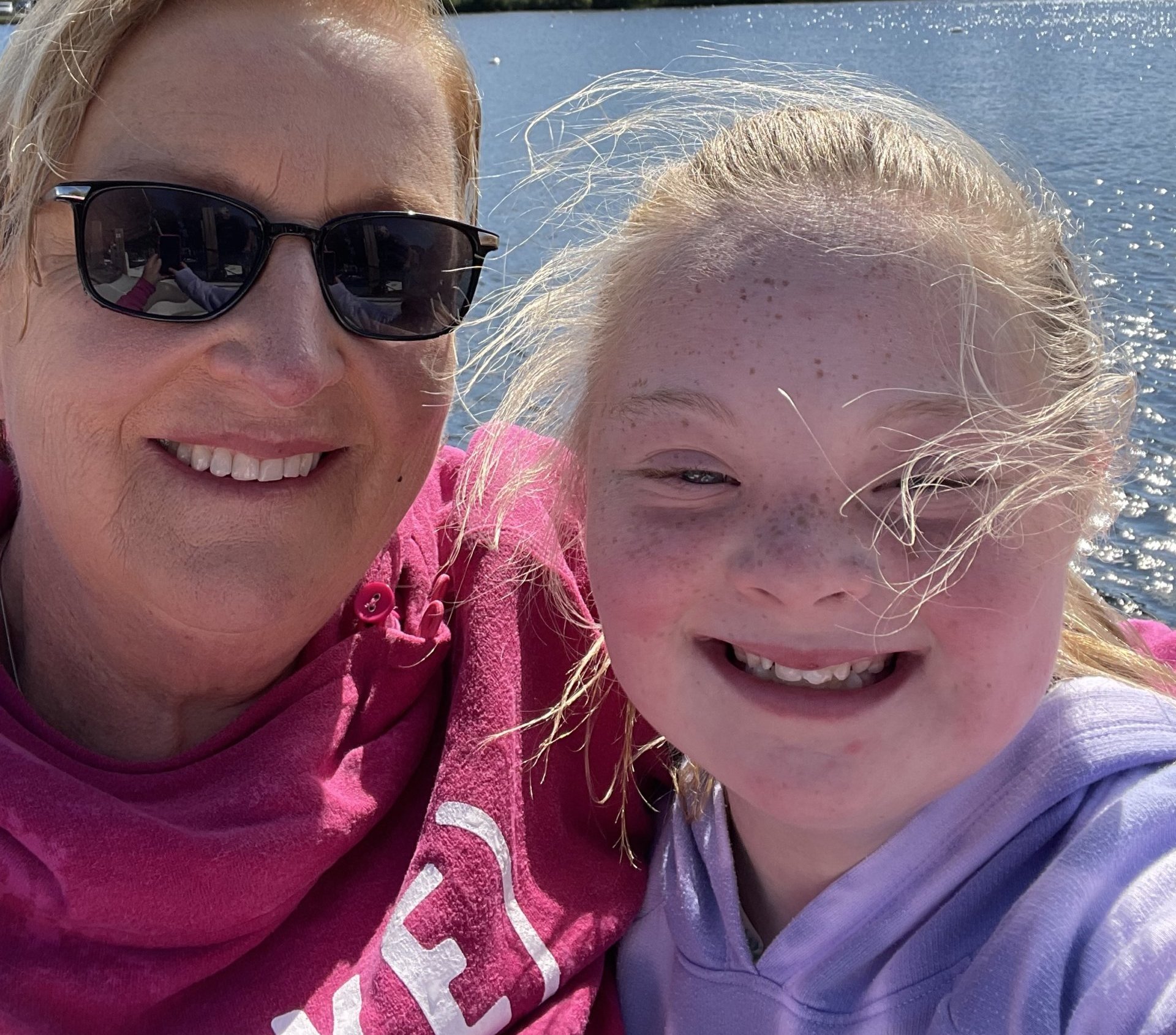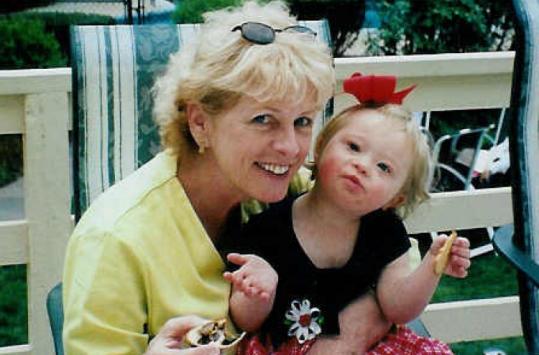Congratulations on the birth of your grandchild!
The birth of a grandchild is one of the most highly anticipated times of a grandparent’s life. A diagnosis of Down syndrome, either prenatally or upon the birth of the child, is generally not anticipated and can be very overwhelming for all family members. Grandparents must navigate their own emotions but are also very concerned about both the newborn and their children, who are now the parents of a child with special needs.
We welcome you to our community where you will find support and helpful information for this new journey.
Down syndrome today
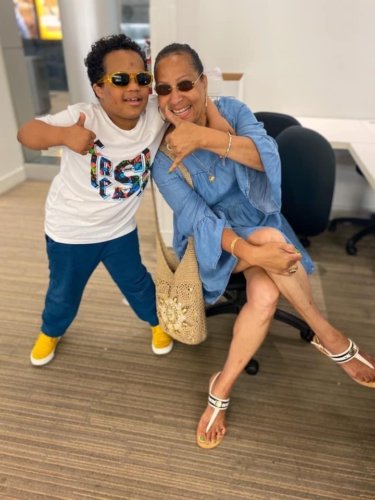
Thankfully, times have changed since we were growing up, and the future is much brighter for individuals born with Down syndrome today. With early intervention, people with Down syndrome are graduating from high school, working at various jobs, living independently, and leading meaningful lives. Upon hearing the diagnosis, many families want to know what their grandchild will be able to do. As with any child, your grandchild’s strengths and weaknesses will emerge over time. Keep in mind that despite having an extra chromosome, all of the child’s genes come from their father and mother. This means his or her appearance, personality, talents, and other traits will resemble those of you and your family!
What you may be feeling
There will probably be a lot of different emotions that you will experience over the next few weeks. Some grandparents have reported feeling concern, worry, anger, grief, confusion, numbness, to name a few.
One grandparent said that the time after the diagnosis was like being in a “tunnel, where you cannot see your way initially. If you keep walking, you do come to the other end.” People will come out of this tunnel at different times, but what you should know is that it is completely normal to go through this process, and most importantly, it gets better with time.
In the words of one grandparent, “A parent wants the best for their children, and their children’s children. It is hard to raise a child. How hard was it going to be to raise a child with a disability? How tough was it going to be for the child?”
There are common fears, but fortunately your child and your grandchild will not have to go through this alone. The child will receive Early Intervention (EI) Services. This EI team will assist the parents in making sure your grandchild has the right start and will provide activities and resources to benefit your grandchild’s development. The family also has access to Down syndrome clinics. The MDSC offers a great deal of support for new parents and for individuals with Down syndrome as they get older. We are here for you all when the time feels right.
Your grandchild will bring much joy to you and your family. Your grandchild will thrive under your love and attention and will be happy to bake cookies with you, play games, go to special events, read stories, sing songs and join you in all the things you would do with any grandchild.
Terminology (aka “People First Language”)
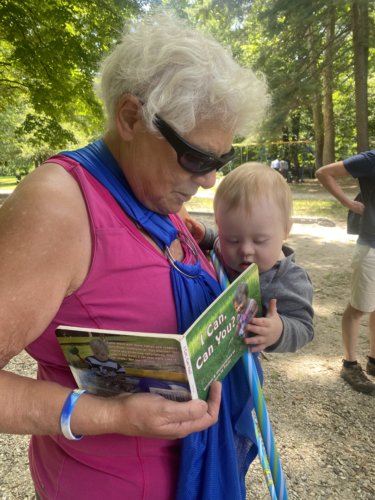 As you know, language evolves, and this is certainly true of the terminology used to describe individuals with Down syndrome.
As you know, language evolves, and this is certainly true of the terminology used to describe individuals with Down syndrome.
At MDSC, we understand that words – whether positive or negative – matter, and their impacts can be either empowering or disempowering. Hurtful language towards those with disabilities, including the “r-word’, must not be tolerated.
As part of the disabilities rights movement, MDSC promotes the use of“People First Language” because people with disabilities are NOT their diagnoses or disabilities. They are PEOPLE first.
MDSC is not only committed to using People First Language in all materials, statements, and interactions. We also work to educate and encourage the community at large to do the same.
Learn more about People First Language.
How you can help
Most grandparents just want to be there for their children, but it might be hard to know what to do. Here are a few ways you might be able to help after the baby arrives:
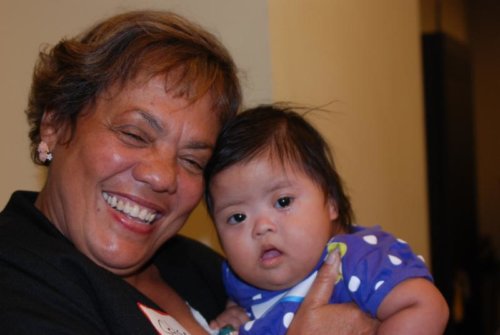 Do what you would do upon the arrival of any baby. Make a dinner, send a takeout gift card, babysit older siblings, or shop for a cute outfit.
Do what you would do upon the arrival of any baby. Make a dinner, send a takeout gift card, babysit older siblings, or shop for a cute outfit.- Try to be sensitive to your child’s feelings. Be patient with your child; he or she will be experiencing a rollercoaster of emotions, so try to be understanding wherever they may be emotionally. We like the phrase “Meet them where they’re at!” Give yourself some grace at
this time as well. - Be as positive as you can. Find aspects about the baby to praise – her sweet little fingers, his beautiful hair, her lovely skin. Although it may be hard to feel positive in the beginning, remember that negative words may be hurtful to your child and will be remembered.
- Show your acceptance of the new baby, like offering to hold and cuddle the baby. New parents will wonder how society will accept this child, and it is very important for them to know that this will not be an issue within their own family. Encourage other extended family members to follow suit.
- Offer empathy, but not pity. There is no doubt about it – raising a child with special needs has its challenges and it helps if you have an understanding of what is in store. However, few parents want to be pitied. They love their children regardless of their diagnosis and it can be difficult when people feel sorry for them for having that child.
- Take other people’s comments in stride. Remember that they are usually well-intentioned, but may not know what is best to say. They will follow your lead, so it’s helpful to say that you appreciate them joining you “on this new journey” and “we are learning as we go and we hope you join us!”
Down the road
Once the parent(s) and baby are home and begin this new journey, there are other ways you might be able to help your children and your grandchild.
Here are some suggestions:
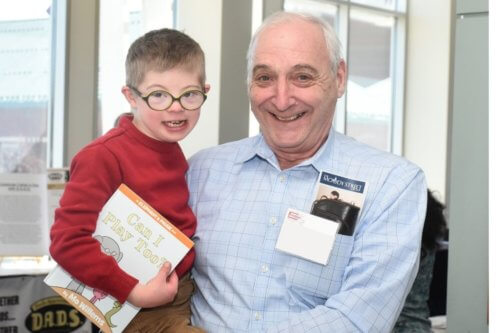 The new parents will be faced with many medical appointments. You can offer to go with them to take notes or offer to watch other siblings. You can make sure that parents are taking care of themselves during appointments or hospitalizations (drinking water, having healthy snacks, etc.)
The new parents will be faced with many medical appointments. You can offer to go with them to take notes or offer to watch other siblings. You can make sure that parents are taking care of themselves during appointments or hospitalizations (drinking water, having healthy snacks, etc.)- Offer to do some research for the new parents. There is a lot of information to sift through, but if you choose one tangible issue to investigate, this could be very helpful.
- Be prepared for ups and downs along the way. The family will have good days and then there will be harder ones. Keep in touch with the family and express interest in updates.
- Learn about Down syndrome today. (See our suggestions under Resources) The more you know, the better you will be able to support your children and your grandchild.
- Take one day at a time. Don’t worry what lies ahead 20 years from now. Focus on that lovely little baby. You will have that special bond with your grandchild that you hoped for and he or she will bring you great joy.
- When your child’s family does not live close by, many of us have found regular phone calls, Zoom, FaceTime, sending cards and small gifts all very beneficial as well.
Resources
There are so many books available that we have found helpful as new Grandparents. Some of our favorites are:
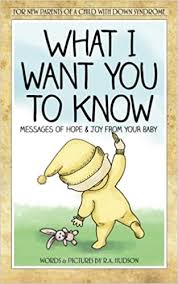 What I Want You to Know by R.A. Hudson
What I Want You to Know by R.A. Hudson- Gifts, Edited by Kathryn Lynard
- Welcoming a Newborn with Down Syndrome (available for download or purchase)
- Your Loved One is Having a Baby with Down Syndrome (available for download or purchase)
- MDSC Education Manual (Hard copy or e-version) — See video below on how grandparents can use the Ed Manual
What You Can Do & How to Get Involved
There are so many ways to get involved in the life of your child — to educate yourself, to spread awareness and make a difference, and to make connections with others in the Down syndrome community.
As your grandchild grows up and learns to advocate for themselves as a strong “Self Advocate”, your involvement, in whatever way feels comfortable to you, will set an important example for them.
Here are some ways you may want to get involved:
- Join the monthly Grandparents Support Group Zoom (reach out below to the group co-leaders)
- Attend a New Family Social (Check our calendar for the schedule of socials or email us at firstcall@mdsc.org.)
- Attend an MDSC Conference (Annual Conference or Educators Forum)
- Join or start your own Buddy Walk team
- Become a Legislative Advocate
- Volunteer
- Donate items for new family welcome packages and/or MDSC CARES/Heartbeats packages such as knitted blankets, hats, etc. (Reach out through email below.)
MDSC offers a free membership for all new grandparents. To reach out to the co-leaders of our MDSC Grandparents group, including for your free membership, please email grandparents@mdsc.org.
Special thanks to the Halton Down Syndrome Association for granting MDSC permission to use select Grandparents content.
How It All Started: Regina Kando
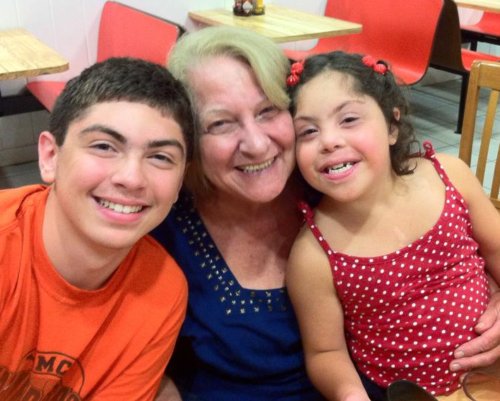
In 2010, Regina Kando, who was enamored with her beautiful granddaughter Sophia, contacted MDSC asking about the possibility of formally establishing an MDSC Grandparents group. Incredibly, that fall, with support from MDSC, Regina welcomed over 45 grandparents at our Buddy Walk & Family Festival in Wakefield. Just like that, the MDSC Grandparents Group was formed!
Over the years, MDSC’s Grandparents Group has connected and supported grandmothers and grandfathers at their own organized events, get-togethers at the MDSC Annual Conference and, of course, at the Buddy Walk. Since the early 2020s, MDSC grandparents living in Massachusetts and beyond have continued to connect during monthly Zoom sessions. This was all part of Regina’s legacy!
In July 2025, we were deeply saddened to learn of Regina’s passing. Even as she retired from leading the group, Regina had continued to join Grandparents Zoom gatherings whenever possible. Her presence, wisdom, and warmth continued to be deeply valued.
Regina touched the lives of so many in our community, and we will be forever grateful for her gift of dedication and compassion to Sophia, our entire grandparent community and the MDSC.
